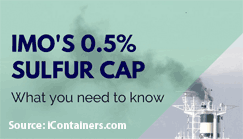In mid-May, the International Maritime Organization (IMO), which sets rules for ocean shipping under an agreement among the vast majority of nations, issued new rules relative to future emissions from cargo ships that may cause some level of chaos and certainly will drive operating costs higher for carriers higher.
The regulations that come into effect Jan. 1, 2020 will most notably significantly reduce allowable sulfur emissions, which cause problems relative to health and to environment in the form of so-called acid raid.
Experts are concerned the short runway before the rules take effect, with make a smooth transition problematic. The new IMO regulation will ban ships using fuel with a sulfur content higher than 0.5%, versus the bunker fuel commonly used today with sulfur levels of 3.5%. Alternatively, a ship can continue to use bunker fuel if it has installed expensive scrubbing systems to reduce the sulfur emissions that way.
A Reuters article on the issue said ships not in compliance will face fines, have their insurance cancelled, and might even be declared "unseaworthy" and thus banned from sailing.
For those ships not opting for scrubbers, the costs for fuel could rise sharply from the new rules. The global cargo shipping fleet (both bulk and container shipping) currently used about 4 million barrels per day (bpd) of bunker fuel. Most of that demand – as much as three-quarters of it, according to an estimate by SEB Bank of Norway - will shift to what is called marine gasoil, a lower sulfur content fuel that meets the new requirements.
Reuters says that Morgan Stanley predicts this will generate at least 1.5 million bpd in extra demand for distillate in the next three years, pushing up total distillate demand growth for the period to 3.2 million bpd. Naturally, such a sharp jump in the face of refining capacity that will be slower to react the market change will send prices higher – perhaps much higher.
Gasoil now trades at a premium of about $250 a ton to bunker fuel, but some forecasts predict this gap will balloon to $380 per ton by early 2020. Thomson Reuters Research estimates fuel accounts for about half a ship’s daily operating cost. Based on average fuel consumption of 20 to 80 metric tons per day, a ship using cleaner fuel faces extra expenses of about $6,000 to $20,000 every day that they sail. That represents a huge increase in total operating costs.
Are Scrubbers the Answer?
The deployment of scrubbers to get rid of the sulfur may be the most economical in the long run, but it will take a lot of capital expense in the short term to make that move. The equipment alone can cost $1 million to $6 million, putting it out of reach of many ocean carriers. By 2020, about 2,000 ships could have scrubbers, according to scrubber maker Wartsila, SEB Bank and industry analyst AlphaTanker.
But AlphaTanker says this a "drop in the ocean," given there are about 90,000 vessels in the global fleet, 60,000 of which make international voyages. Based on the limited number of manufacturers and time constraints on facilities to install scrubbers, AlphaTanker estimates no more than 500 ships could be fitted each year. Wartsila puts the figure closer to 300. Thus it could take more than 100 years to retrofit the global fleet.
 Meanwhile, carriers will need to charge more to shippers to recoup their mandated investment in scrubber systems. Meanwhile, carriers will need to charge more to shippers to recoup their mandated investment in scrubber systems.
A third alternative for ship operators is cheating – not installing scrubbers, and still using existing bunker fuels. Estimates from a variety of source range from 10% to as high as 40% in terms of the percentage of ships that will cheat.
What mechanisms will be used to catch cheaters is unclear. Interestingly, the rise if gasoil will likely send prices for gasoline and diesel fuels for road vehicles up as well. For example, Reuters says that processing Iraq’s Basra Heavy grade with high sulfur content produces as much as 50% fuel oil, while using light, sweet North Sea crude with less sulfur produces about 12% fuel oil from the refining process.
"There will be a bidding war for sweet crude," says Stephen George, chief economist with KBC Advanced Technologies.
Wood Mackenzie estimates that global shipping fuel costs are likely to rise by a quarter, or $24 billion, in 2020. Others estimate extra costs for container shipping alone will be $35 billion to $40 billion.
"It’s going to make moving anything more expensive," said AlphaTanker.
So, good for the planet – but maybe not so good at all for global shipping budgets.
What do you think the new IMO rules? Will there be widespread cheating? How high will osts go up? Let us know your thoughts at the Feedback button below.

|